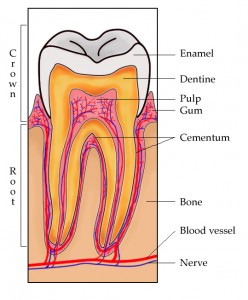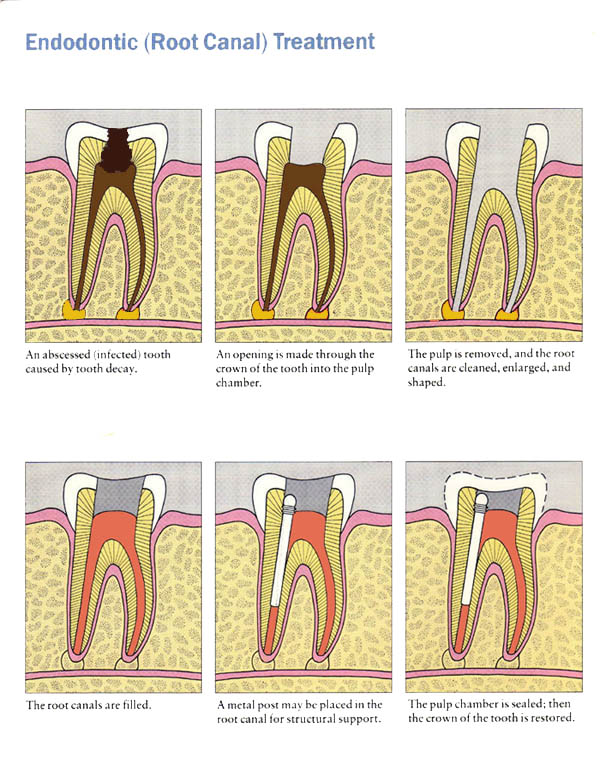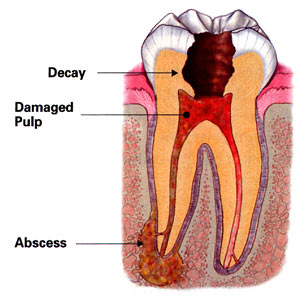 What is Endodontics?
What is Endodontics?
Endodontics is the diagnosis and treatment of inflamed and damaged pulps. Teeth are made up of protective hard covering (enamel, dentin and cementum) encasing a soft tissue living tissue called pulp.
Pulp c0ntains blood vessels, nerves, fibers and connective tissue. The pulp extends from the crown of the tooth to the tip of the roots where it connects to the tissues surrounding the root. The pulp is important during a tooth’s growth and developement. However, once a tooth is fully mature it can survive without the pulp, because the tooth continues to be nourished by the tissues surrounding it.
How Does Pulp Become Damaged?
Number of ways which can damage the pulp include tooth decay, gum diseases, injury to the tooth by accident.
Why Do I Feel Pain?
When pulp becomes infected, it causes increased blood flow and cellular activity and pressure cannot be relieved from inside the tooth. This causes pain. Pulp can even die without causing significant pain.
How Can You Tell if Pulp Is Infected?
When pulp gets inflamed, Â it may cause toothache on taking hot or cold, spontaneous pain, pain on biting or on lying down.On occasion, a damaged pulp is noticed by drainage,swelling and abscess at the root end. Sometimes, however, there are no symptoms
Why Do I Need Root Canal Therapy?
Because the tooth will not heal by itself, the infection may spread around the tissue causing destruction of bone and supporting tissue. This may cause tooth to fall out. Root canal treatment is done to save the damaged pulp by thoroughly cleaning and shaping the root canal system and then filling it with gutta-percha material  to prevent recontamination of the tooth. Tooth is permanently restored with crown with or without post.
What Are The Alternatives to Root Canal Therapy?
If tooth is seriously damaged and its support is compromised, then EXTRACTION is the only alternative.
What Is Root Canal Procedure?
 
Once endodontic therapy is recommended, your endodontist will numb the area by injecting local anesthetic. After this a rubber sheet/rubber dam is placed around the tooth to isolate it. Then the opening is made in the crown of the tooth and very small sized instruments are used to clean the pulp from pulp chamber and root canals. After thorough cleaning and shaping of the root canals, they are filled with rubber material called gutta percha , which will prevent the bacteria from entering this space again. After completion of endodontic therapy, the endodontist places the crown or other restorations so as to restore the tooth to full function.
What Are Risks and Complications?
It has been seen that more than 95% cases of endodontic therapy are successful. However, sometimes because of unnoticed canal malformations, instrument errors ,a root canal therapy may fail.
Does The Tooth Needs Any Special Care after Endodontic Therapy?
Since unrestored tooth is more prone to fracture, so you should not chew hard until it has been completely restored, otherwise you should continue your regular oral hygiene routine including brushing, flossing and regular checkup.
How Many Visits Will It Take To Complete This Treatment?
Nowadays most of the treatment can be completed in 2-3 visits. But treatment time can vary according to the condition of the tooth.
Will I feel pain during or after treatment?
Nowadays will better techniques and better understanding of anesthesia, most of the patients feel comfortable during the treatment. But for the first few days after therapy, you might feel sensation especially if pain and infection was present prior to the procedure. This pain can be relieved by medication. If continuous severe pain or pressure remains, consults your endodontist.
Will I have a Death Tooth After Root Canal Therapy?
No, since the tooth is supplied by blood vessels present in periodontal ligament. It continues to receive nutrition and remains healthy.
Will The Tooth Need Any Special Care or Additional Treatment after Endodontic Treatment?
You should not chew or bite on the treated tooth until you have had it restored by your dentist. The unrestored tooth is susceptible to fracture, so you should visit your dentist for a full restoration as soon as possible. Otherwise, you need only practice good oral hygiene.
Most endodontically treated teeth last as long as other natural teeth.
Can All Teeth Be Treated Endodontically?
Most of the teeth can be treated endodontically. But sometimes when root canals are not accesible, root is severely fractured, tooth cannot be restored or tooth doesn’t have sufficient bone support, it becomes difficult to treat the tooth endodontically. However, advances in endodontics are making it possible to save the teeth that even a few years ago would have been lost.
